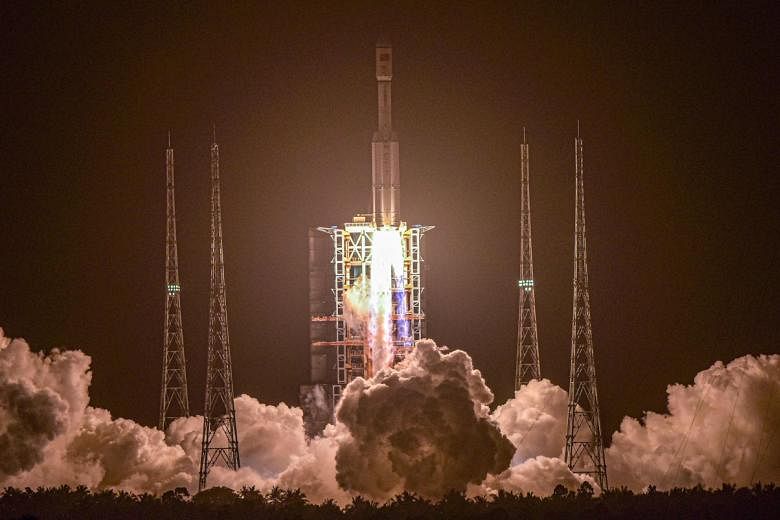BEIJING (AFP, BLOOMBERG) - China's cargo spacecraft Tianzhou-2, whose launch was delayed to late on Saturday (May 29), successfully docked with the space station core module Tianhe on Sunday, the official Xinhua News Agency reported
A Long March-7 rocket carrying the Tianzhou-2 cargo craft - loaded with essentials such as food, equipment and fuel - blasted off at 8.55pm on Saturday Beijing time from the Wenchang launch site on the tropical southern island of Hainan, after a postponement due to technical issues.
Computer-orchestrated rendezvous and docking was completed at 5.01 am Beijing time, the agency said, citing the China Manned Space Agency (CMSA), adding the whole process took about eight hours.
Its successful launch marks the first time that China's space station cargo transportation system, composed of the Tianzhou craft and Long March-7 rockets, was put into use, Xinhua said.
China will need to carry out around 10 missions in total to complete assembly of the space station - named Tiangong, meaning heavenly palace - in orbit.
The station is expected to become fully operational next year. Once completed, it is expected to remain in low earth orbit for up to 15 years.
With the possible retirement of the International Space Station after 2028, Tiangong could become the only human outpost in earth's orbit.
Now that the cargo craft has docked, China plans to begin preparations to send three astronauts up to unpack the goods, which include meals such as shredded pork with garlic sauce and Kung Pao chicken, the agency said.
"We will transport support materials, necessary spare parts and equipment first, and then our crew," Xinhua quoted CMSA director Hao Chun as saying.
Beijing has pumped billions into its space programme in a bid to make up ground on pioneers Russia and the United States, with ambitious projects in Earth orbit and the landing of uncrewed craft on the Moon and Mars.
But it was heavily reprimanded by the US and many experts for a potentially dangerous breach of space etiquette for letting a massive rocket segment free fall to Earth earlier this month after launching the Tianhe core module.
Although the Chinese authorities have said they are open to foreign collaboration on their space station, the scope of that cooperation is as yet unclear.
But the European Space Agency has already sent astronauts to China to train for work inside Tiangong when it is ready.
Earlier this month, China landed its Zhurong rover on Mars, becoming only the third nation to successfully land a craft on the red planet.
The rover has begun roaming to study Martian geology - it is to spend around three months taking photos and harvesting data from a vast northern lava plain.
The US and Russia are the only other countries to have reached Mars, and only the former has operated a rover on the surface.
The launch of the Tianzhou-2 was to have taken place just days after the Mars rover landing, but was postponed for technical reasons.

